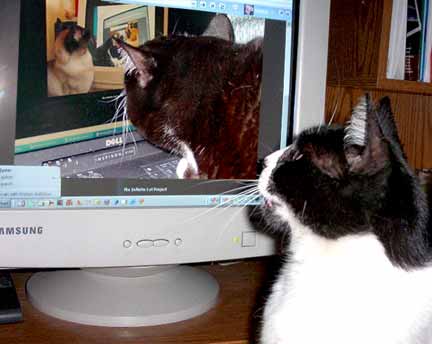| Previous Cat |  |
 |

|
Next Cat |

"Don't let anyone tell you loving a cat is silly. Love, in any form, is a precious commodity."
- Barbara L. Diamond
The Infinite Cat Project
Presented by Mike Stanfill, Private Hand
Illustration, Animation, Web Design
www.privatehand.com
a commodity is an undifferentiated product whose value arises from the
owner's right to sell rather than the right to use. Example: commodities
from the financial world include oil (sold by the barrel), electricity
(most users of electric power are only concerned with overall energy
consumption; only a minority of users are concerned with the quality
and technical details of voltage and frequency deviations, phase imbalance,
etc.), wheat, bulk chemicals such as sulfuric acid, base and other metals,
and even pork-bellies and orange juice. More modern commodities include
bandwidth, RAM chips and (experimentally) computer processor cycles,
and negative commodity units like emissions credits.
In the original and simplified sense, commodities were things of value, of uniform quality, that were produced in large quantities by many different producers; the items from each different producer are considered equivalent. It is the contract and this underlying standard that define the commodity, not any quality inherent in the product. One can reasonably say that food commodities, for example, are defined by the fact that they substitute for each other in recipes, and that one can use the food without having to look at it too closely.
Commodities exchanges include:
* Chicago Board of Trade
* Euronext.liffe
* London Metal Exchange
* New York Mercantile Exchange
Microeconomists also include labor, and currency as commodities that can be bought and sold.
In the original and simplified sense, commodities were things of value, of uniform quality, that were produced in large quantities by many different producers; the items from each different producer are considered equivalent. It is the contract and this underlying standard that define the commodity, not any quality inherent in the product. One can reasonably say that food commodities, for example, are defined by the fact that they substitute for each other in recipes, and that one can use the food without having to look at it too closely.
Commodities exchanges include:
* Chicago Board of Trade
* Euronext.liffe
* London Metal Exchange
* New York Mercantile Exchange
Microeconomists also include labor, and currency as commodities that can be bought and sold.